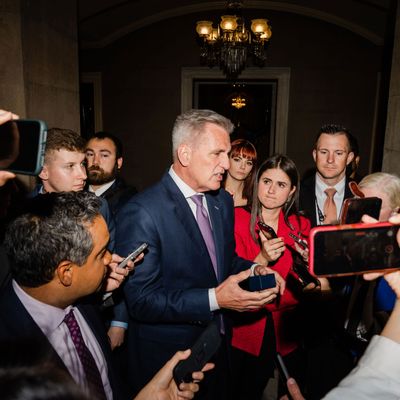
Treasury Secretary Janet Yellen says the federal government will run out of ways to avoid a default on publicly held debt as early as June 1. This has never happened before, despite occasional scares, and it might trigger a national or even a global economic meltdown.
House Republicans have made any debt deal contingent on adoption of an elaborate package of measures that are antithetical to the Democratic Party’s values and interests (big across the board appropriations cuts, plus some obnoxious conservative policy prescriptions). The Democrats who control the White House and the Senate are demanding a “clean” debt limit measure without any — much less these particular — conditions. It is generally understood that House Speaker Kevin McCarthy will instantly lose his gavel if he abandons the ransom his party is demanding. And he also cannot entertain the sort of debt-and-deficit reduction measures Democrats might be interested in because they would include tax increases on the wealthy, an absolute GOP no-no until the end of time.
That means Congress and perhaps the country are plunging hellwards with no real prospect of a deal. Meanwhile, legal beagles are trying to come up with some previously unimaginable way for the administration to avoid a debt default without congressional approval.
So who is to blame for this mess?
You can start with the American people, who keep denying either party the power to effectively govern in Washington. Since 1994, the only time either party had a true governing majority in Congress, along with control of the White House, was a brief moment in 2009; there were exactly enough Democratic senators (60) to override the filibusters that Republicans were beginning to deploy routinely against any legislation they did not like. The moment passed on January 19, 2010, when Republicans picked off a Senate seat in a Massachusetts special election and gridlock resumed.
There are some narrow but important loopholes in the power of Senate minorities to obstruct congressional majorities (notably “budget reconciliation” bills which are limited to fiscal matters and federal court and Cabinet confirmations). Thus, Democrats were able to get some important work done in the 117th Congress despite very narrow margins of control in both congressional chambers (and shakedowns from their own senators).
But then Republicans flipped control of the House in 2022. That meant no budget reconciliation bills and a Congress mostly confined to symbolic “messaging” legislation. Unfortunately, there are a few things a divided government must agree on: appropriations to keep the federal government running, and the legal capacity to borrow so that past federal debt can be serviced. Failure to keep the government operating is damaging to the public interest, albeit usually temporary. Failure to accommodate debt would be instantly catastrophic. Any voters who split tickets because they like the idea of “checks and balances” in Washington should take a good look in the mirror if a divided government defaults on the national debt.
It’s easy to say the two parties engaged in this dangerous game of chicken should just come to the table and compromise. But there are important matters of principle at stake. The hard-core conservatives who pull McCarthy’s strings believe sabotaging Big Government is a holy cause. And Democrats (most especially including Joe Biden) remember that when Barack Obama compromised with House Republicans in 2011, Americans wound up with spending cuts they did not actually support and that severely hamstrung Obama’s second term.
Indeed, the legacy of 2011 is undermining both parties’ interest in compromise. Since then, centrist Democrats like Biden have been suspected by their fellow partisans of insufficient “spine” in facing down Republicans. Meanwhile Republican leaders like Kevin McCarthy have been accused by the MAGA/House Freedom Caucus types of being “RINOs” unwilling to blow up the “deep state” and reverse progressive policies at any cost. Activists in both parties have constantly urged their elected officials to fight fight fight for them. It has become a bipartisan tradition of uncompromising partisanship. If leaders of either party flinch and “cave,” it will simply confirm the activist tendency to treat politics as purely a matter of superior will, which in the context of a debt limit crisis means superior willingness to risk sending the country down the road to perdition.
While the idiotic elevation of spine over brains in both parties needs to come to an end, the answer is not to appoint some centrist “deal-maker” like Joe Manchin to run the country; compromise from an unprincipled position just serves unprincipled interests, like the lobbyists who always seem to get into the room where deals are cut. Let’s also not forget that some of the great betrayals of American history have been marketed as “great compromises” (e.g., in 1850, protecting slavery, and in 1876, ending Reconstruction). The best protection against the kind of calamities like a debt default is a bipartisan commitment to mechanisms to keep the country running when agreement is impossible. And ultimately we also need an American electorate that understands it’s better to choose between the two parties than to deny them the opportunity to govern.
More on politics
- What We Learned From the House Ethics Report on Matt Gaetz
- Everyone Biden Has Granted Presidential Pardons and Commutations
- Trump Is Threatening to Invade Panama, Take Back Canal






























